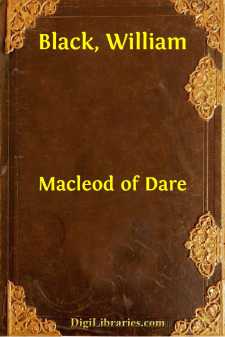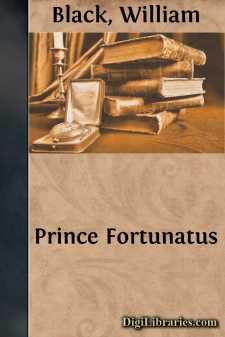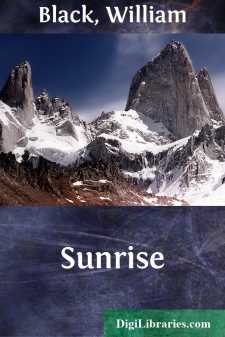Categories
- Antiques & Collectibles 13
- Architecture 36
- Art 48
- Bibles 22
- Biography & Autobiography 813
- Body, Mind & Spirit 142
- Business & Economics 28
- Children's Books 15
- Children's Fiction 12
- Computers 4
- Cooking 94
- Crafts & Hobbies 4
- Drama 346
- Education 46
- Family & Relationships 57
- Fiction 11828
- Games 19
- Gardening 17
- Health & Fitness 34
- History 1377
- House & Home 1
- Humor 147
- Juvenile Fiction 1873
- Juvenile Nonfiction 202
- Language Arts & Disciplines 88
- Law 16
- Literary Collections 686
- Literary Criticism 179
- Mathematics 13
- Medical 41
- Music 40
- Nature 179
- Non-Classifiable 1768
- Performing Arts 7
- Periodicals 1453
- Philosophy 64
- Photography 2
- Poetry 896
- Political Science 203
- Psychology 42
- Reference 154
- Religion 513
- Science 126
- Self-Help 84
- Social Science 81
- Sports & Recreation 34
- Study Aids 3
- Technology & Engineering 59
- Transportation 23
- Travel 463
- True Crime 29
Macleod of Dare
by: William Black
Description:
Excerpt
CHAPTER I.
THE SIX BOYS OF DARE.
The sun had sunk behind the lonely western seas; Ulva, and Lunga, and the Dutchman's Cap had grown dark on the darkening waters; and the smooth Atlantic swell was booming along the sombre caves; but up here in Castle Dare, on the high and rocky coast of Mull, the great hall was lit with such a blaze of candles as Castle Dare had but rarely seen. And yet there did not seem to be any grand festivities going forward; for there were only three people seated at one end of the long and narrow table; and the banquet that the faithful Hamish had provided for them was of the most frugal kind. At the head of the table sat an old lady with silvery-white hair and proud and fine features. It would have been a keen and haughty face but for the unutterable sadness of the eyes—blue-gray eyes under black eyelashes that must have been beautiful enough in her youth, but were now dimmed and worn, as if the weight of the world's sorrows had been too much for the proud, high spirit. On the right of Lady Macleod sat the last of her six sons, Keith by name, a tall, sparely built, sinewy young fellow, with a sun-tanned cheek and crisp and curling hair, and with a happy and careless look in his clear eyes and about his mouth that rather blinded one to the firm lines of his face. Glad youth shone there, and the health begotten of hard exposure to wind and weather. What was life to him but a laugh: so long as there was a prow to cleave the plunging seas, and a glass to pick out the branching antlers far away amidst the mists of the corrie? To please his mother, on this the last night of his being at home, he wore the kilts; and he had hung his broad blue bonnet, with its sprig of juniper—the badge of the clan—on the top of one of many pikes and halberds that stood by the great fireplace. Opposite him, on the old lady's left hand, sat his cousin, or rather half-cousin, the plain-featured but large-hearted Janet, whom the poor people about that neighborhood regarded as being something more than any mere mortal woman. If there had been any young artist among that Celtic peasantry fired by religious enthusiasm to paint the face of a Madonna, it would have been the plain features of Janet Macleod he would have dreamed about and striven to transfer to his canvas. Her eyes were fine, it is true: they were honest and tender; they were not unlike the eyes of the grand old lady who sat at the head of the table; but, unlike hers, they were not weighted with the sorrow of years.
"It is a dark hour you have chosen to go away from your home," said the mother; and the lean hand, resting on the table before her, trembled somewhat.
"Why, mother," the young man said, lightly, "you know I am to have Captain ——'s cabin as far as Greenock; and there will be plenty of time for me to put the kilts away before I am seen by the people."
"Oh, Keith," his cousin cried—for she was trying to be very cheerful, too—"do you say that you are ashamed of the tartan?"
"Ashamed of the tartan!" he said, with a laugh. "Is there any one who has been brought up at Dare who is likely to be ashamed of the tartan! When I am ashamed of the tartan I will put a pigeon's feather in my cap, as the new suaicheantas of this branch of Clann Leoid. But then, my good Janet, I would as soon think of taking my rifle and the dogs through the streets of London as of wearing the kilts in the south."
The old lady paid no heed. Her hands were now clasped before her. There was sad thinking in her eyes.
"You are the last of my six boys," said she, "and you are going away from me too."
"Now, now, mother," said he, "you must not make so much of a holiday. You would not have me always at Dare? You know that no good comes of a stay-at-home."
She knew the proverb. Her other sons had not been stay-at-homes. What had come to them!
Of Sholto, the eldest, the traveller, the dare-devil, the grave is unknown; but the story of how he met his death, in far Arizona, came years after to England and to Castle Dare. He sold his life dearly, as became one of his race and name. When his cowardly attendants found a band of twenty Apaches riding down on them, they unhitched the mules and galloped off, leaving him to confront the savages by himself. One of these, more courageous than his fellows, advanced and drew his arrow to the barb; the next second he uttered a yell, and rolled from his saddle to the ground, shot through the heart....







